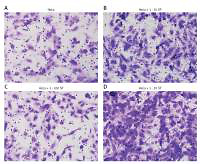Current issue
Archive
Manuscripts accepted
About the Journal
Editorial office
Editorial board
Section Editors
Abstracting and indexing
Subscription
Contact
Ethical standards and procedures
Most read articles
Instructions for authors
Article Processing Charge (APC)
Regulations of paying article processing charge (APC)
OBSTETRICS AND GYNAECOLOGY / BASIC RESEARCH
Semen affects the biological behavior of HeLa cells by altering ERK signaling
1
Department of Gynecology and Obstetrics, Shengjing Hospital of China Medical University, Shenyang, China
Submission date: 2018-12-08
Final revision date: 2018-12-24
Acceptance date: 2019-01-06
Online publication date: 2019-01-30
Publication date: 2020-05-26
Arch Med Sci 2020;16(4):915-923
KEYWORDS
TOPICS
ABSTRACT
Introduction:
The aim of the study was to investigate the effects of human semen on the proliferation, survival, migration and invasion of HeLa cervical cancer cells by analyzing the extracellular regulated protein kinase (ERK) pathway.
Material and methods:
HeLa cells were stimulated with different concentrations of human semen. MTT assay was used to analyze the effects on cell proliferation. Apoptosis in the different experimental groups was quantified by Annexin V-FITC/PI staining. The effect of seminal plasma on in vitro invasiveness of cells was evaluated using transwell assay. Western blotting was used to evaluate ERK pathway activation.
Results:
Human semen promoted HeLa cell proliferation; ERK1/2 phosphorylation and c-myc expression also increased with increasing semen concentration. U0126 inhibited semen-induced ERK1/2 phosphorylation, c-myc upregulation and cell proliferation. Compared with the control group, semen did not significantly affect the apoptotic rate of HeLa cells (p > 0.05). The transwell assays showed that compared with the control group, the number of invading cells increased significantly with increasing semen concentration, and the difference was significant (p < 0.05) when 1 : 50 semen was added, suggesting that semen promotes the invasion of cervical cancer cells. Western blotting indicated that ERK1/2 phosphorylation began to increase when 1 : 100 semen was added; with increasing semen concentration, ERK1/2 phosphorylation was significantly up-regulated, and the expression of its downstream target gene, c-myc, was also up-regulated (p < 0.05).
Conclusions:
Semen promoted the proliferation of HeLa cells by activating the ERK pathway and showed increased tumorigenic potential in vivo. Human seminal plasma might be a potential factor contributing to the development of cervical cancer.
The aim of the study was to investigate the effects of human semen on the proliferation, survival, migration and invasion of HeLa cervical cancer cells by analyzing the extracellular regulated protein kinase (ERK) pathway.
Material and methods:
HeLa cells were stimulated with different concentrations of human semen. MTT assay was used to analyze the effects on cell proliferation. Apoptosis in the different experimental groups was quantified by Annexin V-FITC/PI staining. The effect of seminal plasma on in vitro invasiveness of cells was evaluated using transwell assay. Western blotting was used to evaluate ERK pathway activation.
Results:
Human semen promoted HeLa cell proliferation; ERK1/2 phosphorylation and c-myc expression also increased with increasing semen concentration. U0126 inhibited semen-induced ERK1/2 phosphorylation, c-myc upregulation and cell proliferation. Compared with the control group, semen did not significantly affect the apoptotic rate of HeLa cells (p > 0.05). The transwell assays showed that compared with the control group, the number of invading cells increased significantly with increasing semen concentration, and the difference was significant (p < 0.05) when 1 : 50 semen was added, suggesting that semen promotes the invasion of cervical cancer cells. Western blotting indicated that ERK1/2 phosphorylation began to increase when 1 : 100 semen was added; with increasing semen concentration, ERK1/2 phosphorylation was significantly up-regulated, and the expression of its downstream target gene, c-myc, was also up-regulated (p < 0.05).
Conclusions:
Semen promoted the proliferation of HeLa cells by activating the ERK pathway and showed increased tumorigenic potential in vivo. Human seminal plasma might be a potential factor contributing to the development of cervical cancer.
Share
RELATED ARTICLE
We process personal data collected when visiting the website. The function of obtaining information about users and their behavior is carried out by voluntarily entered information in forms and saving cookies in end devices. Data, including cookies, are used to provide services, improve the user experience and to analyze the traffic in accordance with the Privacy policy. Data are also collected and processed by Google Analytics tool (more).
You can change cookies settings in your browser. Restricted use of cookies in the browser configuration may affect some functionalities of the website.
You can change cookies settings in your browser. Restricted use of cookies in the browser configuration may affect some functionalities of the website.



